Category: Civil Debates
 Welcome to Debate Day #1 – Creative Cities
Welcome to Debate Day #1 – Creative Cities
WHEN: Doors @ 7pm, debate @ 7.30pm
WHERE: The Theatre Centre Pop-Up, 1095 Queen St. West, at Dovercourt
PWYC at the door. No RSVP required. Cash bar for the thirsty.
This evening Darren O’Donnell, Roy Mitchell, Kevin Stolarick, and Sabra Ripley will debate the resolution:
Be it resolved that the Creative Cities theories serve to reinforce dominant class structures.

MORE DB8 INFO
Hosted by Theatre Centre Artistic Director Franco Boni
Moderated by Praxis Theatre Artistic Director Michael Wheeler
The event will be live-tweeted via @praxistheatre & @theatrecentre. The Debate Hashtag is: #CivilDebates.
Not on Twitter/Don’t want to be? Below is a livestream of the tweets and pictures using the #CivilDebates hashtag, feel free to follow along live from this post.
Want more info on the topic, the debaters, and how the event will work? CLICK PIRATE & NINJA.

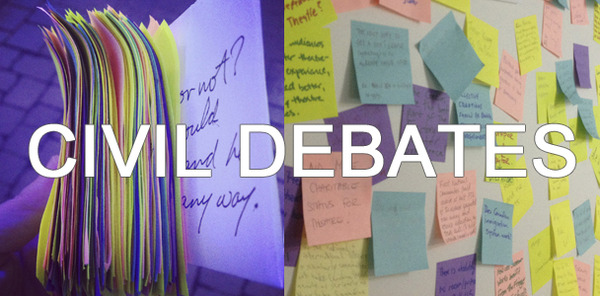
The Resolution:
Be it resolved that the Creative Cities theories serve to reinforce dominant class structures.
The Context:
The emergence of the Creative Economy and Creative Class (via Wikipedia)
The publication of John Howkins’ The Creative Economy and Richard Florida’s book The rise of the Creative Class gave the movement a dramatic lift as global restructuring was hitting deep into the US. Its timing hit a nerve with its clever slogans such as “talent, technology, tolerance” and interesting sounding indicators like the “bohemian index” or the “gay index”, that gave numbers to ideas. Importantly it connected the three areas: a creative class – a novel idea, the creative economy and what conditions in cities attract the creative class. Florida concluded that economic development is driven in large measure by lifestyle factors, such as tolerance and diversity, urban infrastructure and entertainment.
Critics argue that the Creative City idea has now become a catch all phrase in danger of losing its meaning. Cities also tend to restrict its meaning to the arts and activities within the creative economy professions calling any cultural plan a creative city plan, when this is only an aspect of a community’s creativity. There is a tendency for cities to adopt the term without thinking through its real organizational consequences and the need to change their mindset. The creativity of the creative city is about lateral and horizontal thinking, the capacity to see parts and the whole simultaneously as well as the woods and the trees at once.
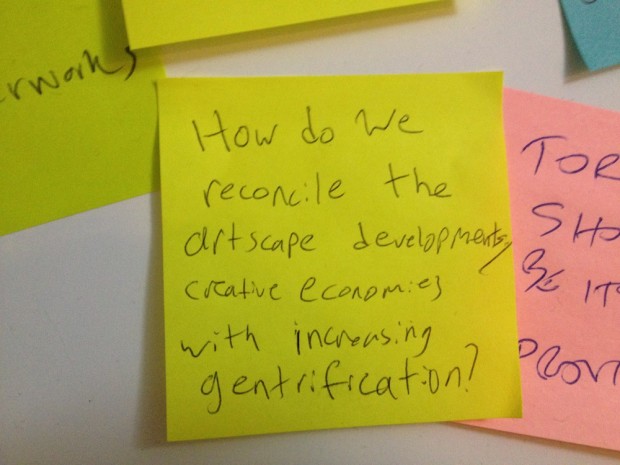
A post-it with one of the debate topics suggested at our interactive debate suggestion installation at The Next Stage Festival
The Debaters:
Side A – SUPPORTING THE RESOLUTION
Darren O’Donnell is a novelist, essayist, playwright, director, designer, performer, Artistic Director of Mammalian Diving Reflex and Research Director of The Tendency Group, an emerging think tank and social policy laboratory. His books include: Social Acupuncture, which argues for an aesthetics of civic engagement and Your Secrets Sleep with Me, a novel about difference, love and the miraculous. His best-known work is Haircuts by Children, which was first created in collaboration with the children of Parkdale Public School in 2006. In addition to his artistic practice, he is currently an Msci candidate in Urban Planning at the University of Toronto.
Roy Mitchell is the Executive Directorof Trinity Square Video. Roy comes to the Trinity team as a member, past board member and trouble maker. His work has screened internationally, and he has curated for local film festivals and written on art, film, and video. He believes a busy artist-run-centre is a good artist-run-centre.
Side B – OPPOSING THE RESOLUTION
Kevin Stolarick: Dubbed the “Official Statistician of the Creative Class”, Kevin Stolarick, PhD, combines a depth of knowledge with an appreciation of the importance of finding and sharing the knowledge or “pearls of wisdom” gained from his comprehensive understanding of the Creative Class and the Creative Economy. He is the Research Director at The Martin Prosperity Institute at the Rotman School of Management, University of Toronto. He holds a PhD in Business Administration and an MBA from the Tepper School of Management, Carnegie Mellon. Kevin provided quantitative research and analytical support for several of Richard Florida’s books including The Rise of the Creative Class and Rise Revisited (the 10thAnniversary Edition). He continues in collaboration with Richard and others researchers.
Sabra Ripley is a community artist and arts-advocate with a Masters of Public Health in community development and health promotion, focused on arts as a means of developing strong, healthy individuals and communities. She is currently the Executive Director of Ottawa’s House of PainT Festival of Urban Arts and Culture and a Cultural Outreach Officer in the City of Toronto’s Arts Services unit. In recent years Sabra has worked as Interim-Coordinator for the billboard tax advocacy group Beautiful City, as a Management Consultant for the Artists Mentoring Youth Project, and as a Researcher for the Scarborough Arts Council’s Creative Mosaic project. As a community artist she danced with the all bgirl DeCypher Crew and acted with Salamander Theatre for Young Audiences.
 The Format:
The Format:
Side A1 7 minutes
Side B1 7 minutes
Side A2 7 minutes
Side B2 10 minutes
Side A1 3 minutes
Following the formal debate, the floor will be opened to the audience for questions and comments.
The Role of Audience:
Each attendee will be provided with 2 tokens. One may be used to make a statement or ask a question when the floor is opened to the audience. The second may be used to register support for or against the resolution when exiting the pop-up at the end of the evening.
The Added Excitement!
At the conclusion of the debate, the 4 debaters who will tackle the following resolution at Civil Debates #2 on April 1st will be announced.
Be it resolved that Boards of Directors have the right and responsibility to overrule the Artistic Direction of a theatre company.
CIVIL DEBATES
Debate 1: Creative Cities
WHEN: March 15, 2013; doors 7pm, debates 7.30pm
WHERE: The Theatre Centre Pop-Up, 1095 Queen St. West, at Dovercourt
PWYC at the door. No RSVP required. Cash bar for the thirsty.
Facebook Event Page, Twitter Hashtag: #CivilDebates

So Mea Culpa:
Some of you may understandably have tonight as the kickoff date to the Civil Debates series. This was the case in the original announcement. As we began talking to the array of incredible speakers who will be participating, we realized we had our order of operations out of order. Finding a day that works for all the participants first was what we should have done – then announce the dates.
Anyhow, live and learn. As we finalize our speakers lists we think these changes will be worth it and now we know how to go about it next time. Soooooo there is a: NEW DATE
JOIN US TO KICK OFF CIVIL DEBATES ON MARCH 15th, 2013
Brought to you by Praxis Theatre and The Theatre Centre, Civil Debates take the passionate and articulate exchanges from praxistheatre.com out of the virtual space and bring them into a face-to-face setting.
Our debate format is based on the Canadian Parliamentary model with two speakers on either side. Just like the best performances we see on stage, each debater has a responsibility to hear the arguments and respond – not just deliver a prepared statement. At the end of the debate, the floor will be opened to the audience, who will have the opportunity to share their own responses and to register their votes on the topic.
Due to the nature of the format, the discussion requires a bold, clear statement to begin, and our intention is to ensure we have some of the best speakers on each side of that statement to address their viewpoints with passion and rigour.
On March 15, the debaters will tackle the following resolution:

Debate 1: Creative Cities
“Be is resolved that the Creative Cities theories serve to reinforce dominant class structures.”
Speakers include Kevin Stolarick, Research Director, Martin Prosperity Institute; Roy Mitchell Executive Director, Trinity Square Video; and Darren O’Donnell, Artistic & Research Director, Mammalian Diving Reflex.
JOIN the debate at The Theatre Centre Pop-Up on Friday, March 15th or follow a live tweetcast via #civildebates.
CIVIL DEBATES
Debate 1: Creative Cities
WHEN: March 15, 2013; doors 7pm, debates 7.30pm
WHERE: The Theatre Centre Pop-Up, 1095 Queen St. West, at Dovercourt
PWYC at the door. No RSVP required. Cash bar for the thirsty.
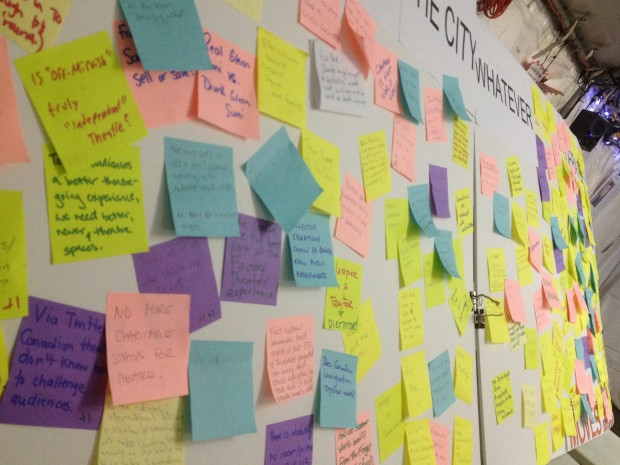
We collected more that 100 suggestions for debate topics at The Next Stage Festival in January
After receiving over 100 suggestions for debate topics as well as a slew of suggestions for debaters through our interactive installation at The Next Stage Festival, Praxis Theatre and The Theatre Centre have distilled three resolutions to be tackled at the first three Civil Debates.
Each of these topics were suggested multiple times through the installation, have already received significant online debate, and have the potential to create reasonable arguments for and against the resolution:
March 7, 2013
March 15, 2013
#1: Creative Cities
Be it resolved that the Creative Cities theories serve to reinforce dominant class structures.
April 4, 2013
April 1, 2013
#2: Arts Boards
Be it resolved that Boards of Directors have the right and responsibility to overrule the Artistic Direction of a theatre company.
May 2, 2013
Date TBD
#3: Idle No More
Be it resolved that the issues that created the Idle No More movement require extreme methods to achieve change.
 de·bate, noun. /dɪˈbeɪt/
de·bate, noun. /dɪˈbeɪt/
— a formal discussion on a particular matter in a public meeting or legislative assembly, in which opposing arguments are put forward and which usually ends with a vote.
ci·vil, adj. /ˈsɪv(ə)l, -ɪl/
— relating to ordinary citizens and their concerns.
— courteous and polite.
Oxford Dictionary
Civil Debates will take place on the first Thursday of each month, starting March 7th at The Theatre Centre Pop-Up. The speakers for each debate will be announced in advance on praxistheatre.com and theatrecentre.org. If you would like to debate a particular topic, email info@praxistheatre.com with why in less than 100 words. If selected, debaters are paid a $50 honorarium.
Live tweetcasts will be available for each debate, along with blog posts and social media sharing to facilitate further discussion. Civil Debates use the Canadian parliamentary debate model: 2 speakers on each side, strict time allotments, moderated exchange and conclude with a vote Yay or Nay. Audience members will be given the opportunity to participate, but it is not required
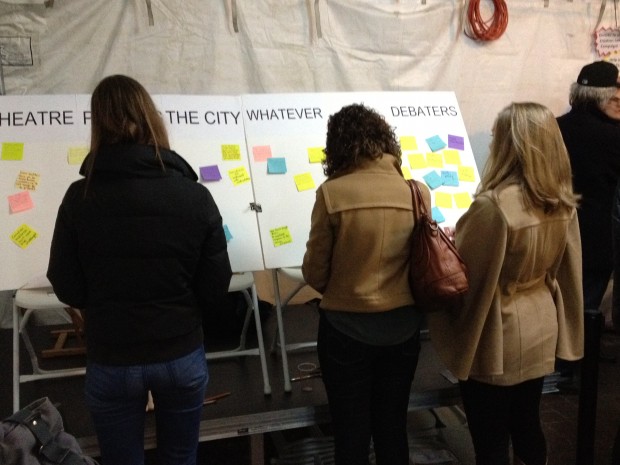
Praxis Theatre and The Theatre Centre present
CIVIL DEBATES
First Thursday of the month: March 7, April 4, May 2, 2013. Doors at 7pm; debates at 7.30pm
The Theatre Centre Pop-Up, 1095 Queen St. West
Admission: PWYC
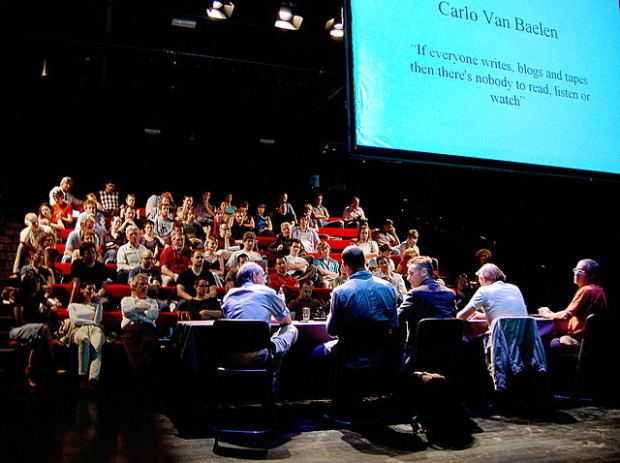
Click the image to read the full post on The Theatre Centre website.
Photo by Han Soete via Creative Commons
In December last year we announced a new joint initiative with The Theatre Centre called Civil Debates: an opportunity for two speakers from opposite sides of an argument to debate their perspectives for a live audience. It will also be a forum for attendees to participate and vote for their preferred argument.
The topics for the first four debates of the series will be suggested by YOU, the community, via a live installation on January 12 & 13 at the Next Stage Festival’s tent at Factory Theatre.
Click on the image above for all the details, and see you at the beer tent!

Photo by Han Soete via Creative Commons
In 2013 Praxis Theatre and The Theatre Centre launch Civil Debates.
 Civil Debates is a monthly series that invites two speakers from opposite sides of an argument to debate their perspectives for a live audience. It is also a forum for all attendees to participate and vote on who and what they agree with.
Civil Debates is a monthly series that invites two speakers from opposite sides of an argument to debate their perspectives for a live audience. It is also a forum for all attendees to participate and vote on who and what they agree with.
We hope this will be an opportunity to extend the online community we have developed over the years in a face-to-face setting, bringing those conversations into a physical space. We’re enthused by the intelligent and civil discourse that has developed on praxistheatre.com, particularly in the comments of posts about hot button issues.
This got us thinking – ‘Hey – as a theatre company, shouldn’t we doing this live in a space with human bodies?’
Debate Questions
 The topics for the initial four debates will be curated via a gallery installation January 12 and 13 at The Next Stage Festival at Factory Theatre.
The topics for the initial four debates will be curated via a gallery installation January 12 and 13 at The Next Stage Festival at Factory Theatre.
A dual system will be used in facilitating participation: Both sticky notes and a laptop will be available to post issues and ideas that people believe would benefit from more debate. These can be posted to topics like: Theatre, Politics, The City, and Whatever. There will also be the opportunity to suggest who you think would be a great debater.
The goal is to emerge with four questions that will inspire compelling debaters to participate in an event that has genuine community interest.
Debate Format
 Debates will take place monthly at The Theatre Centre at 1095 Queen St. W (Queen and Dovercourt) in February, March, April and May 2013.
Debates will take place monthly at The Theatre Centre at 1095 Queen St. W (Queen and Dovercourt) in February, March, April and May 2013.
Debate format will be based on the Canadian Parliamentary model with two speakers for either side. Just like the best acting, each debater should have a responsibility to hear the arguments that come before them and respond – not just deliver a prepared statement.
Each debate will have a moderator whose job will be to ensure debaters obey the general rules as well as the speaking format. The formal debate will last around 40 minutes.
At the end of the debate, the floor will be opened to other participants, each of whom can speak for a period of two minutes. All participants, speaking and non, will be provided the opportunity to register their vote on the topic at the conclusion of the evening. These results will be posted back here on praxistheatre.com where further debate and conversation, as always, is encouraged.
Join the Debate
If you are interested in being a debater or moderator, drop us a line via info@praxistheatre.com. Tell us why critical, respectful debate is important in 150 words or less.
Hope to see you in the tent during the final weekend of The Next Stage Festival. This series begins when we get our topics from you.
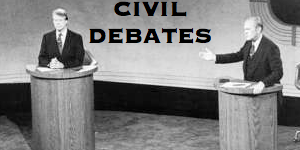
 Welcome to Debate Day #1 – Creative Cities
Welcome to Debate Day #1 – Creative Cities













Recent Comments